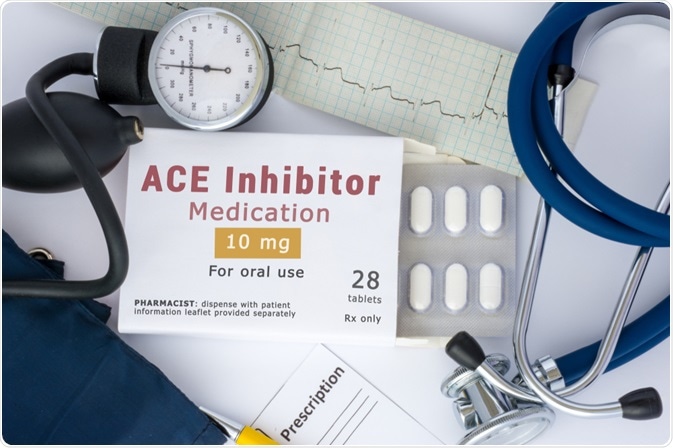Initial evidence of the existence of renin, which is an angiotensinogenase enzyme secreted by the kidney, was presented to the medical community more than 100 years ago. Nevertheless, the significance of renin in the regulation of arterial blood pressure, as well as its role in the renin–angiotensin system in cardiovascular diseases, were not fully grasped until the 1970s.
The renin-angiotensin system has a fundamental role in hypertension development, mediating its effects via the peptide hormone angiotensin II, which increases arterial tone, activates sympathetic neurotransmission, stimulates aldosterone release, and promotes renal sodium reabsorption. Therefore, over-activation of this system contributes to hypertension and associated end-organ damage.
Types of renin inhibitors
The inhibition of renin and, subsequently, the renin-angiotensin system, can be achieved at various points. Some of the different agents that can be used to achieve this include angiotensin-converting enzyme (ACE) inhibitors, which reduce the conversion of angiotensin I to angiotensin II, angiotensin receptor blockers (ARBs), which antagonize the interaction of angiotensin II with the type-1 angiotensin II receptor, as well as direct renin inhibitors, which block the proximal step in the conversion of angiotensinogen to angiotensin I by directly inhibiting the action of renin.
Renin inhibitors
ACE inhibitors and angiotensin receptor blockers
The development of the first class of ACE inhibitors stemmed from the observation that different polypeptides isolated from the venom of the Brazilian snake Bothrops jararaca could potentiate bradykinin, which is an endogenous vasodilator nonapeptide, as well as inhibit ACE. The discovery of ARBs followed after researchers found that simple benzylimidazoles act as weak antagonists of angiotensin II receptors.
Within a few years after their introduction in the clinical practice, ACE inhibitors became established as highly effective therapeutic agents for all grades of hypertension and congestive heart failure. The clinical uses for angiotensin receptor blockers include the aforementioned two indications; however, they are also useful in the treatment of both stroke and diabetic nephropathy.
Both ACE inhibitors and ARBs reduce the downstream effects of angiotensin II and thus do not have a direct influence on renin. The advent of computational molecular modeling has made effective renin inhibitors both a reality and a valuable addition to the medical techniques that are currently available to clinicians who are prescribing antihypertensive drugs.

Image Credit: Shidlovski / Shutterstock.com
Direct renin inhibitors
Aliskiren represents the first drug in the class of orally active and direct renin inhibitors for the treatment of hypertension. This novel compound was originally developed using both X-ray crystallography of the active site of renin, as well as computational modeling. The non-peptide structure of the drug overcame certain difficulties of previous attempts to develop efficacious renin inhibitors.
The major characteristic of a direct renin inhibitor is that it blocks the rate-limiting step in the renin-angiotensin system. In doing so, the inhibitor subsequently decreases the production of both angiotensin I and II, increases plasma renin concentration, the latter of which is similar to that which occurs when ACE inhibitors and ARBs are used. However, unlike other drugs, plasma renin activity is decreased when a direct renin inhibitor is used.
The systemic availability of aliskiren is limited, as less than 3% of the drug is being absorbed. Still, its half-life of approximately 40 hours allows effective once-daily dosing, with steady-state plasma concentrations achieved after 5-8 days. The main route of elimination is biliary excretion and subsequent fecal elimination.
The largest clinical studies to date with aliskiren have investigated the use of doses of up to 600 milligrams per day and have indicated their efficacy in lowering blood pressure values in patients with hypertension.
The favorable effect of aliskiren on plasma renin activity implies that if the drug is used in the combination with antihypertensive agents that otherwise increase renin activity, the end-effect should be more beneficial than if used as a monotherapy. As a result, combinations of aliskiren with hydrocholorthiazide, ramipril and ibesartan have been investigated in open studies and demonstrated their ability to control blood pressure values.
Conclusion
Taking into account the public health importance and pervasive use of antihypertensive agents, it is important to understand their comparative effects on clinical outcomes. In 2012, a report from Healthcare Research and Quality (AHRQ) of the United States Department of Health and Human Services identified the future research of comparative effectiveness between ACE inhibitors, ARBs, and direct renin inhibitors as one of the priorities in the field.
References
Further Reading
Last Updated: Sep 25, 2022